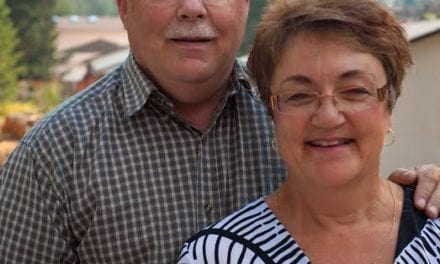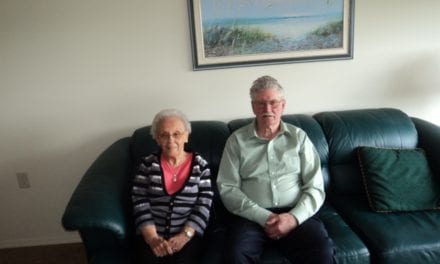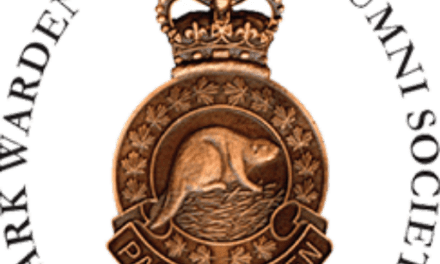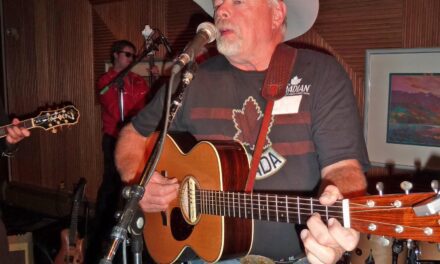MD: Any rescue, or enforcement stories that stick out in your mind?
Brian: Yes, the rescue…the one that comes to mind would be…there were three or four climbers hung up on the north face of Mount. Robson. We got the call, and there were a few of us out there. We got our stuff together, and went out to the base of Mount. Robson, and said, “OK, what are we going to do…”. The weather was kind of iffy, so Willi decided the best course of action there was to put a team up at Snowbird Pass up on the north side of Robson, and another team on the south side, and there were two helicopters, and whoever got the weather would get in there first. The other team – Clair Israelson’s team – it was Clair, and Gord Irwin, and (they) got in, and so they got to the top, and the weather’s the shits, so they bivouacked there for the night, and the Snowbird Pass team, we went down to the ranger cabin and stayed there for the night. So we waited for the weather, and Willi said, “Well, you guys might as well come back down to the base.”, and we went down to the base, and the wait is on, and finally the weather improved a little bit, and the guys started down the ridge and picked up these guys. In the meantime, there was a lady that had broke her leg up near Whitehorn Cabin – so a couple of guys went up there and got her, and brought her back. So we’re waiting for the goings-on up top, in case they needed help, and so they got these guys up on top of the mountain, and now they’re trying to work their way back down – they didn’t get very far. So we’re there at the staging area, and Jack Rutherford comes in, he’s a local rafter and he was wanting to start a rafting thing down the Fraser, and they had come down the Fraser into this canyon, and upset the raft, and he had two guys stranded on this rock in the middle of the river. And it’s just raging water. And so, “OK…no problem!” We got the helicopter sling – people looking around must have thought, oh these guys do it every day! So the sling was all hooked up, and the helicopter sitting there, and Willi says, “Brian, you go!” And so Brian went, and took a couple of harnesses, Todd McCready was the pilot, and we slung into this rock, and I said to Todd, “Do you want me to unhook?” “No” he said, “The wind’s good here.” So I put a harness on one, get him up to the highway, came back and picked up the other one. So then, we do this, so that’s two successes so far. So then (back on Mount Robson) we’re waiting and waiting, and later on in the afternoon, we got a break. And these guys were up high – around 11,000 feet, or maybe higher. It turned out to be the highest mountain rescue made by a 206 helicopter. And Todd McCready, light on gas, went up and got the climbers off, plus one warden.
But there’s Gord and Clair and one other warden, I’m not sure, but they were still stuck up there, and the weather closed down, and Todd couldn’t get up to get them. So, it was funny, because the media was there, and all the rest of that, and as soon as the climbers were down – poof, it was nice, because they were gone – there was no interest anymore. And, in the meantime, we had two guys stuck up on the mountain! In the flight out from the top, everybody’s gathering their equipment together, and throwing it in their packs and stuff, and they had gone away with one of Gord Irwin’s crampons – so now he was a one-crampon guy, and so they started to work their way down, and Al McDonald had a team there at – there’s a hut up about half-way up Robson – and he started to work his way up with his team – and met up with Clair and Gord, and they were doing good anyway. But it was a struggle. This is all over three days. The first day, we got up there, the second day was the rescue with the lady and the river person and part of the crew – all the mountain climbers down, and on the third day Tom and the rest of them came down. This was in summer – August (?) – so that was memorable.
There’s lots of little ones, but…But the other one…there are two that stand out, and it’s kind of a sad one, a guy by the name of Rick Black, who worked with the Trail Crew here, and he ended up as a Ranger out at Robson. That was good for him. And then there were a couple of guys from the lodge (Jasper Park Lodge) that were good spelunkers (cavers), and another fellow from Parks, Chris Zimmerman and Rick went up to Arctomys Cave, because it’s the deepest one. They got down to the bottom of the cave, and then the last part was a bit of a drop, so they rappelled off of this rock, and down they went. They said, “It’s time to go”, and they were going up, and the rock moved, and came down and landed on Rick Black. He was hurt badly, and so the two guys from Jasper went for help (it’s a long ways out of the cave), and they had another 8 miles to walk out to the highway, so it was going to be a long time. So, Rick is dying, and this other fellow didn’t want to leave him, and finally Rick said, “You’ve got to get out of here because your light’s going…”
So then we were called in to help, and PEP (Provincial Emergency – a Provincial team) came in, and Robson Park was there, we were there, and under Clair Israelson, we set up a base team. So we got a whole bunch of guys, and we had to organize a big camp up at the top in this basin where the cave went down, and it was just like a Fire Command Team – “OK, this is what we’ve got to do – let’s do it.” So we were the guys at the bottom and helping out, and the other guys were up, and so on the way out – boy, this really bothers me – he was a really good friend too. On the way out, he took a wrong turn and ended up in a dead end. So he came back, and his light started to fail, and finally the light went out just as he got to the main route. So all he could do was sit, and wait in the dark, not sure exactly where he was. So it must have been just terrible for him. So then down go our guys, and the spelunkers from the coast, and they start bringing Rick out. And that’s not an easy task in a cave, but they got him out, and so got everything down off the mountain. So again, it’s the way when there’s a crisis, or a big job to do, to see that the three different organizations (and the RCMP was in there too) come together, and get it done. And the egos set aside.
And I guess the other unfortunate thing that happened, was…Pat was a seasonal warden here, and a great guy, a great climber – he was marked as a public safety leader. He and his girlfriend, Lisa Paulson, were out climbing an icewall out near Tangle Ridge, and he was rappelling off and his pin came out and down he came. And he didn’t survive. So that was a sad day. (Lisa later became the Public Safety Coordinator).
And the other one was…and I was Chief Park Warden at the time, was when Mike Wynn was killed in an avalanche. He was with Randy Fingland and Brad Romaniuk – they were taking a (snow) profile, and were coming back down and were hit by this avalanche. So they ended up in the hospital, and so they got Mike out, and got him flown to Foothills Hospital in Calgary, because there’s always hope, ? Steve Blake went with him, and Steve and Mike were very good friends. And so you go to bed that night at 12 or 1 o’clock in the morning, and then get this call at 3 o’clock, and they say, “ Brian, he didn’t make it.” So the next morning, I had to go in and break the news to Randy and Brad in the hospital. It really shook Randy up, and he had a hard time with it. That was the same era as the whole law enforcement stuff was going on, and again there’s a couple of reasons it went as it did, but wardens from all over came to that funeral. There was a team group from the Yukon (Kluane) that came down – they flew them down in an RCMP plane – down they came. It was a tribute (to Mike), but also that was wardens coming together. It was a tough time, with all the whole law enforcement – the way things were going, and then this on top of it – I guess it was just time to say, hey, let’s…
Brian: (I’ll talk out of school here for a little bit)….
I was the type of guy that really liked people, and worked together closely with them, and part of that is outside the job. So I would have a little bottle of “water” in my drawer. (Sometimes somebody else put stuff in there!) But anyway, after work, depending on the day or on the time, people would start to wander over and sit down and we’d start chatting. And really and truly, had a few drinks – people would sit around my beautiful table that the carpenter built me, and talk shop. And we got some real quality time out of that, you know? But again, you’re working together and stuff. And so, back to Mike Wynn, apparently this little gathering in my office was known to a few different wardens. And so we went over to the church to say goodbye to Mike, and then we went back over, and I think it was Steve Blake and I, – drove in, and here in my office – you could see through the window, all these Kluane guys sitting around my table…into my stash. But you sure couldn’t do that now.
MD: What about the Warden Service was important to you?
Brian: The opportunity to make a difference. To be there for people – especially in the public safety. To pass on information out in the backcountry to people who really didn’t know where they were going. Where do you start? We were in a position – we were such a close…and actually people looked at us as a very successful group – to a point where Ron (Hooper) and I tried to make that bridge to appreciate the other functions. I appreciated that – having the opportunity to make a difference in Elk Island, and back to Jasper here, and just to get that cohesiveness. I remember back in the day where a Chief Park Warden would argue up and down that he needed this money, and it wasn’t going anywhere…and meanwhile the campgrounds and the gates are making us all the money to survive, and they needed money. And it didn’t happen. But, with being a Chief Park Warden, and being a member of the Management Team, you could start having some influence. And so, Ron Hooper was an excellent Superintendent to work for, and it got to a point where we had this fantastic management team in Jasper. Everybody was there to help everybody else, so you go around the table, and you look at your budgets and stuff, and the campground guy would say, “Well, we need a little bit here”, and then, “Well, OK, I think we can spare a little bit from here”, and so we would make it happen. And part of the reason – they were great people, but sometimes great people can’t really get that cohesiveness, so I said to Ron one day, I said, “Ron, (it was just he and I) what I’d like to do is organize a backcountry trip. Let’s take the management team into Willow Creek. So we did that, and we got the supplies in there with some standby helicopter time (we get a lot of supplies flown in, and then we’d ride in with fresh meat and whatever else we were taking in there) and so it was really successful. We went into Willow Creek a couple of years, and to a little longer trip up to Rocky Forks – but there, you built a team. Because you’re standing there washing dishes together – you’re hauling wood together, you’re chopping wood, and it really worked. I remember Paul Galbraith – this is when Finance hated the Wardens – and so Paul says, “Brian, we need to take Andy (Walker) on a trip.” And I said, “OK – I’m in.” and so we got Andy on his horse, and went in to Willow Creek, and down to Shalebanks, and out.” He could actually see the trails, what we were working on, and stuff like that. No, we got back down, and he said, “What do you need?” So it’s just little things like that that make such a difference.
MD: Is there anybody from the Warden Service that stands out in your mind?
Brian: I guess Toni Klettl – he was the first Warden that I worked under, and he really took a liking to me, and so when I moved to 45, he was my boss as well, like out of town here, and he let us pretty well run our own show, but he was there for any help.
MD: Is he still alive?
Brian: No, he passed away. Willi Pfisterer was another one that kind of took me under his wing, and I became quite competent mountaineer. I wasn’t a Clair Israelson or any of those big-time climbers and stuff, but I would get the job done. And I got to take Willi on a couple of backcountry trips, and he loved it. He had ridden a little bit, back in his younger days. I took him on the Smoky, and around the North Boundary putting up weather stations.
MD: Hi, this is Part 2 of an interview with Brian Wallace on March 29.
Brian: I think we were talking about Willi Pfisterer. I learned tons from Willi, both in the climbing end of it, and how he handled emergencies in a calm and very efficient manner. So he was a good leader, and I did lots and lots of trips with him. And as far as mountaineering…actually when they went to Logan in ’73, I was the 10th guy on the list, and there was 9 going, and so I was training in case one them got sick, or broke something or whatever, so I remember up at Willow Creek, (I was thinking) “How are you going to keep in shape?” You have to be running and stuff. So we had skidoos at the time, so I had a packed trail, and after my day, I’d get out and run along this packed trail – didn’t work too well! Another individual that stands out – all these people that I’m talking about, except for Toni, they were not Wardens but different parts of the Warden Service – our Barn Boss, Dennis Welsh, stands out. He was an old cowboy, and we formed a really good friendship over the years. He retired when I came back from Elk Island. And as far as wardens go, Gerry Israelson, Darro Stinson in the public safety business. There’s a whole bunch of people that I’ll miss here – so we’ll leave it at that.




Recent Comments